Key takeaways:
- Ethical dilemmas challenge personal beliefs, prompting reflection on values and the complexity of choices, especially in pro-life advocacy.
- Pro-life advocacy emphasizes compassion, support systems for women, and the inherent dignity of all human life from conception to natural death.
- Effective strategies for resolving ethical dilemmas include active listening, seeking common ground, and employing empathy to foster understanding during difficult conversations.
- Building resilience in advocacy involves self-care, connecting with fellow advocates for support, and setting boundaries to prevent burnout.
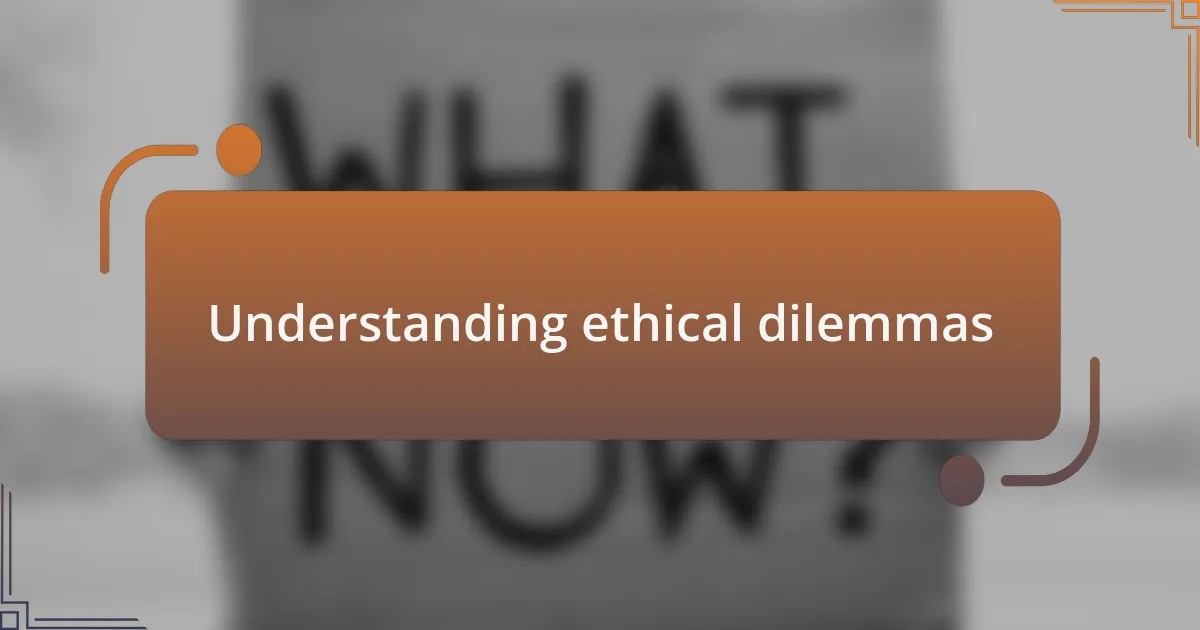
Understanding ethical dilemmas
Ethical dilemmas often arise when our values and beliefs are put to the test. For instance, I vividly remember a conversation with a friend who was struggling with her decision about whether to support a pro-choice policy. It made me wonder: how do we reconcile our deeply held beliefs with the diverse opinions around us?
Navigating these dilemmas can feel like walking a tightrope. I often find myself asking, “What is the right choice here?” In moments like these, I draw on my experiences and the emotional weight of the situation to guide my decisions. It’s not always clear-cut, and that uncertainty can be profoundly unsettling.
When faced with conflicting ideals, I find it helpful to reflect on why I hold certain beliefs. For example, my commitment to pro-life advocacy is rooted in my understanding of human dignity. Yet, I acknowledge the complexities surrounding each unique situation, which can often blur the lines between right and wrong. How do we balance compassion for individuals with a commitment to our principles?
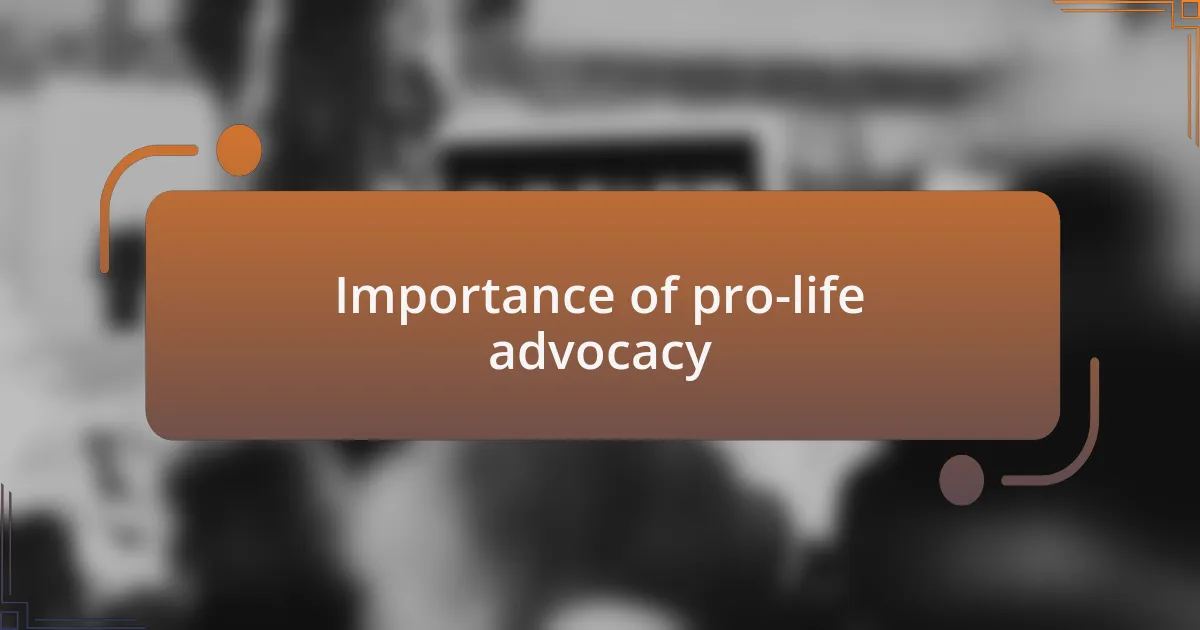
Importance of pro-life advocacy
Pro-life advocacy plays a crucial role in fostering a culture that values every human life, from conception to natural death. In my own journey of advocacy, I’ve witnessed the impact of sharing personal stories. Each story serves as a heartwarming reminder of why we stand firm in this belief: lives transformed often come from unexpected beginnings.
Understanding the importance of pro-life advocacy goes beyond just opposing abortion; it’s about promoting support systems for women and families. I remember volunteering at a local pregnancy center, where I met countless brave women facing challenging circumstances. Their resilience emphasized that by advocating for life, we also advocate for comprehensive care and resources, underscoring the profound love we all have for our fellow human beings.
Furthermore, pro-life advocacy encourages society to engage in difficult conversations about life and choice. Reflecting on my discussions with others, I’ve found that these dialogues can illuminate perspectives and drive deeper empathy. How can we facilitate understanding while holding true to our convictions? It’s through these very conversations that we can bridge divides and foster a more compassionate society.
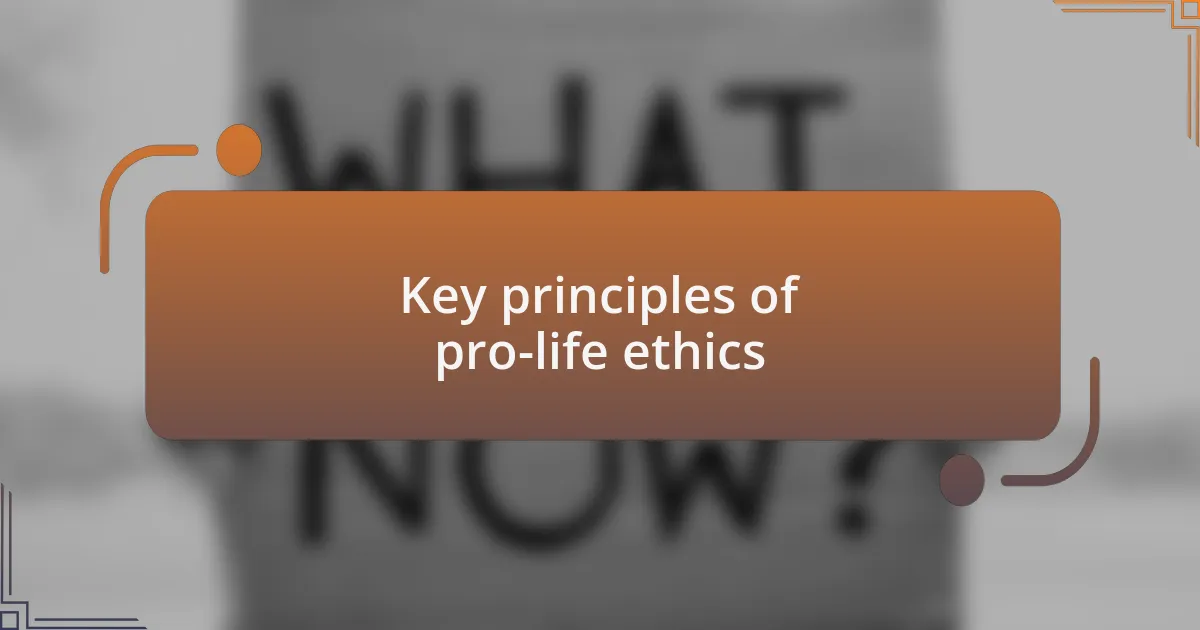
Key principles of pro-life ethics
The core of pro-life ethics revolves around the inherent dignity of every human being. I often find myself reflecting on a conversation I had with a close friend, who initially saw the issue of abortion through a different lens. As we explored the significance of life, it became clear that recognizing each person’s worth goes beyond individual circumstances; it’s about embracing a universal truth that every life can contribute uniquely to our collective experience.
Another principle is the value of compassion and care for both mother and child. I recall a moment during a community outreach event, where we highlighted the importance of supporting pregnant women facing difficult decisions. Listening to their stories reinforced my belief that being pro-life means advocating for a nurturing environment, ensuring that every woman knows she is not alone and that help is available. How can we better support those in crisis? It’s vital to promote resources that empower women to choose life without fear.
Lastly, pro-life ethics emphasizes the sanctity of life from conception to natural death. I remember a poignant discussion at a local forum where someone questioned the implications of this belief in the context of end-of-life issues. This exchange led to an eye-opening realization: our commitment to life also extends to discussions about dignity in dying and the importance of supporting loved ones through challenging times. How do we balance honoring life while respecting individual choices? This is where ongoing dialogue becomes crucial, inviting us to navigate these complex issues with empathy and integrity.
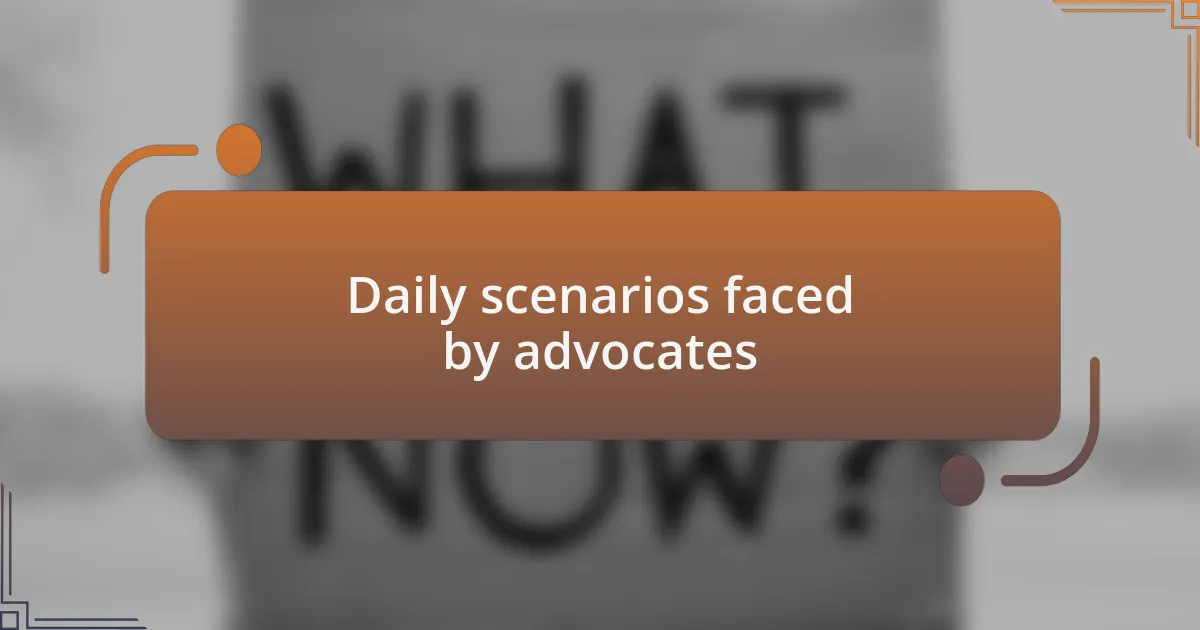
Daily scenarios faced by advocates
Every day, I encounter scenarios that challenge my pro-life principles in unexpected ways. Just last week, I was speaking with a colleague about an unwanted pregnancy and the stigma surrounding it. It struck me how often the conversation centers on judgment rather than understanding. How do we shift that narrative to one of empathy? I believe that by opening a space for honest dialogue, we can help others feel free to share their fears without the weight of societal expectations.
Another common scenario is navigating conversations about the legal aspects of abortion. During a recent community meeting, someone expressed frustration over restrictive laws, arguing that they infringe on women’s rights. This made me reflect on the balance we must maintain between advocating for the unborn and respecting a woman’s autonomy. It’s a delicate tightrope walk. How do we articulate our position without dismissing the emotional complexity that often surrounds such decisions?
I also find that advocating for life means addressing misconceptions about pro-life values. A few days ago, a friend expressed her opinion that being pro-life means being anti-women. This really resonated with me and made me consider the disconnect that many feel. How can we effectively communicate that valuing life encompasses advocating for the well-being of both mother and child? It’s moments like these that motivate me to share stories that illustrate the holistic support system we can create—a nurturing network that affirms life through every stage.
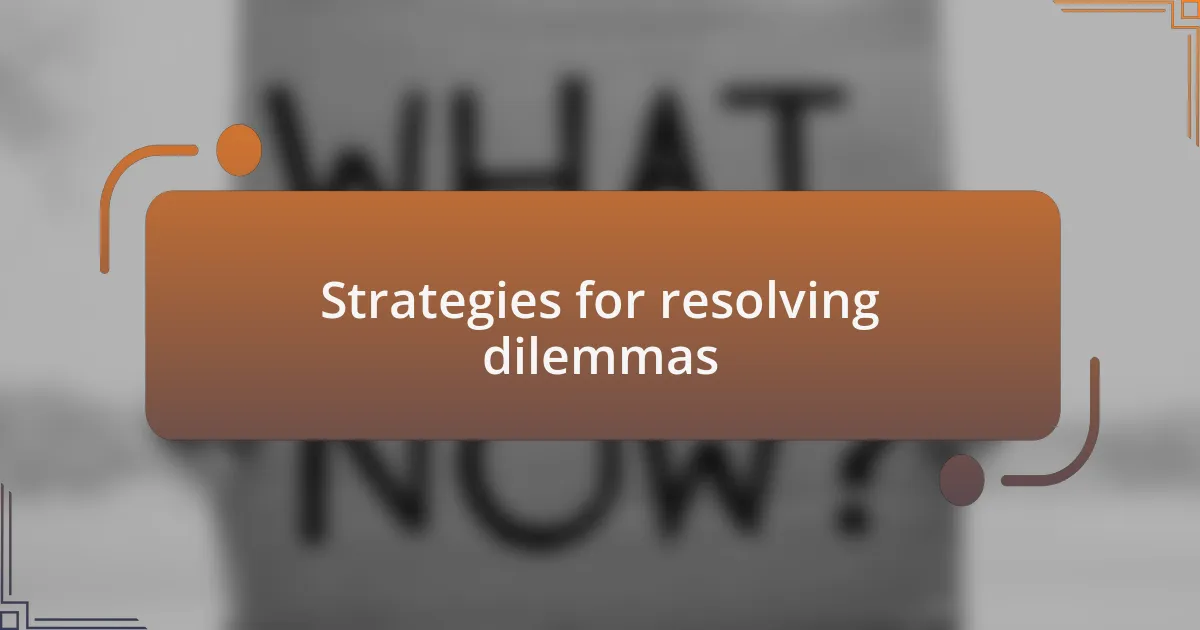
Strategies for resolving dilemmas
One effective strategy for resolving dilemmas is to deepen my understanding of differing viewpoints. I recall a conversation I had with a close friend who is pro-choice; we discussed both sides passionately. Instead of becoming defensive, I chose to listen actively and reflect on her concerns. This approach not only enriched my perspective but also fostered an atmosphere of respect and openness.
Another strategy involves seeking common ground before delving into contentious issues. For instance, in a recent discussion at a local gathering, I focused on shared values like compassion and care for families. By establishing our mutual desire for a supportive community, it became easier to discuss divergent opinions without escalating tensions. I’ve found this technique often leads to fruitful dialogues where solutions can emerge.
Finally, employing empathy during difficult conversations can act as a bridge over troubled waters. When I encountered a woman struggling with her pregnancy decision, I shared my own journey of uncertainty during a similar time in my life. This vulnerability encouraged her to open up about her fears, and together, we explored options that honored her feelings while emphasizing the value of life. Such moments remind me that personal stories can pave the way for understanding and resolution in the face of ethical dilemmas.
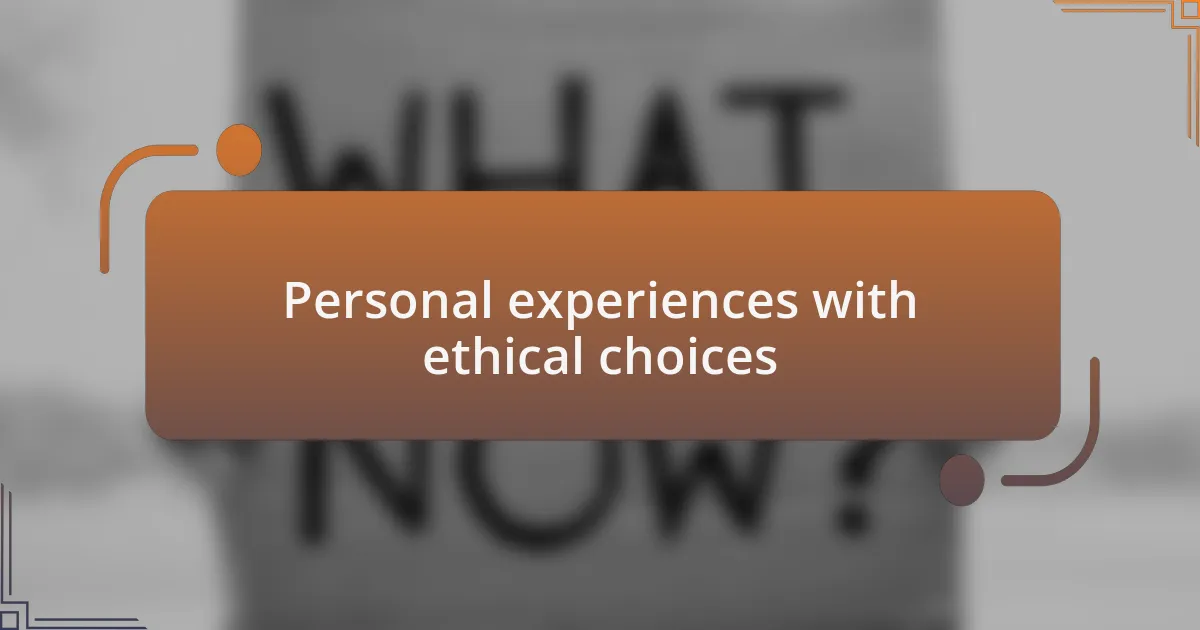
Personal experiences with ethical choices
There have been moments when I found myself standing at the crossroads of my values and the realities of those around me. I remember one instance when a colleague confided in me about her unexpected pregnancy and the fears she faced. Instead of offering a blanket opinion, I shared my own experience of feeling overwhelmed during a similar time, and we both reflected on what it means to carry the weight of such decisions. It was in that vulnerability that we found a shared humanity, illuminating the often tricky path of ethical choices.
In another instance, while volunteering at a local hospital, I witnessed how individual stories often defy simplistic labels. A young woman, grappling with the aftermath of an abortion, expressed profound feelings of regret. Listening to her heartfelt account not only reminded me that ethical choices are rarely black and white but also reinforced my commitment to support those who might be struggling with their decisions. How do we navigate such emotional landscapes while holding true to our beliefs? This experience underscored the power of empathy in bridging our differences.
I’ve also faced ethical choices in my interactions with family. At a recent family gathering, discussions about the pro-life stance sparked tensions among relatives. Instead of retreating into my views, I approached the conversation with an open heart. I asked them about their experiences and thoughts, which led to a deeper understanding of their fears and hopes. This dialogue shifted the atmosphere from conflict to connection, proving that even in difficult discussions, I could honor differing opinions while remaining rooted in my principles. How do we find that balance? I believe it’s through sincere, open conversations that we can make ethical decisions that respect everyone’s journey.
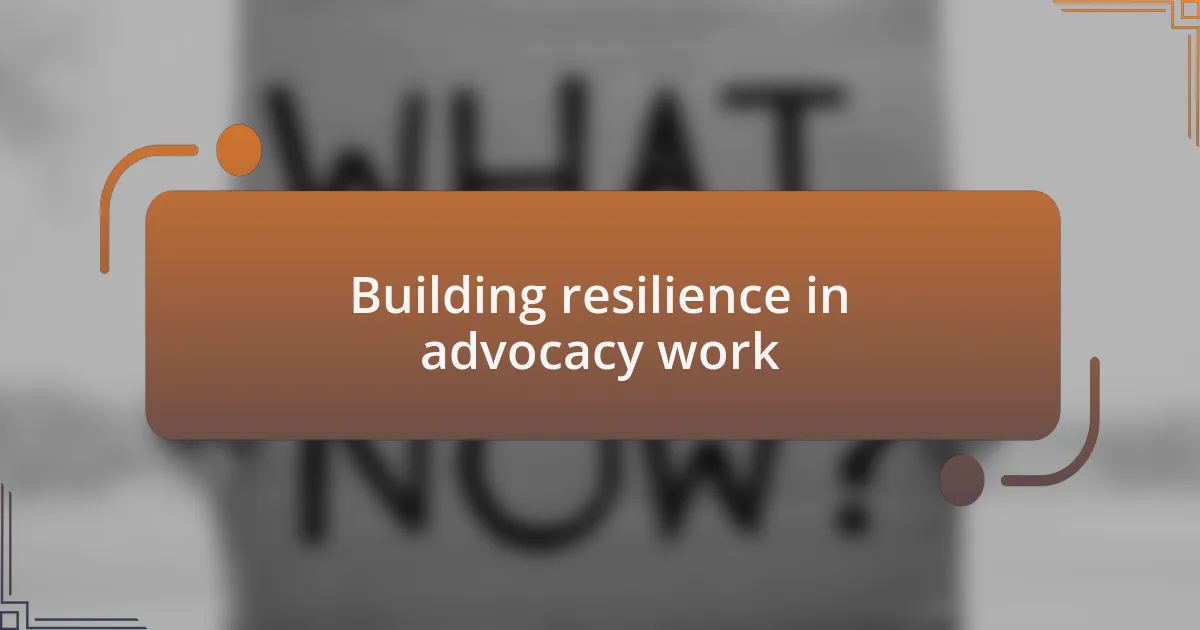
Building resilience in advocacy work
Building resilience in advocacy work requires intentional reflection and self-care. I remember a day when I felt utterly drained after a community meeting where opposing views clashed. Instead of dwelling on the negativity, I treated myself to a quiet walk in nature. That moment of solitude allowed me to recharge and see the bigger picture, reminding me that advocacy isn’t just about the daily battles; it’s about nurturing my spirit to keep going.
Interestingly, I’ve found that connecting with fellow advocates significantly bolsters resilience. During an online support group, I found solace in hearing others share their frustrations and triumphs. It’s a reminder that we are not alone in our struggles. How often do we underestimate the power of shared experiences? Engaging with others provides a network of support that strengthens our resolve and fuels our commitment to the cause.
Sometimes, resilience is about setting boundaries. I once took on too many projects, driven by passion but quickly realized I was on the verge of burnout. This prompted me to evaluate my priorities and learn to say no when needed. How can we contribute effectively if we are running on empty? By respecting our limits, we can sustain our efforts in the advocacy landscape, ensuring that we fight the fight without losing ourselves in the process.